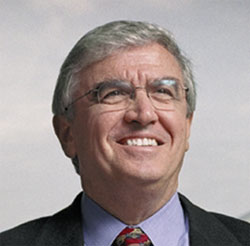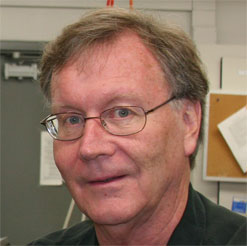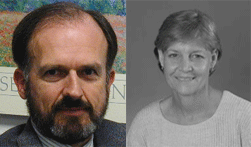Calit2@UCI Affiliates Collect Accolades
By Anna Lynn Spitzer
Irvine, Calif. 02.23.07 – Eight Irvine division Calit2 academic affiliates have earned awards and recognition recently for exemplary research and service to their fields.
Nicolaos G. Alexopoulos, The Henry Samueli School of Engineering dean, and electrical engineering and computer science professor, has been elected to the National Academy of Engineering. The appointment is one of the most prestigious professional lifetime distinctions awarded to engineers.
Alexopoulos is one of 64 new members and nine foreign associates to join this distinguished group. He was recognized for his outstanding contributions to “microwave circuits, antennas and structures for low observable technologies, and for contributions in engineering education.”
Kenneth Shea, professor of chemistry, has received a 2007 Arthur C. Cope Scholar Award from the American Chemical Society, recognizing his significant contributions to organic chemistry. Shea, one of 10 recipients of the award nationwide, will receive $5,000, a certificate and an unrestricted research grant of $40,000. Awardees will be honored at the 234th ACS national meeting in Boston in August.
|
|
Shea’s research broadens the scope of organic chemistry by focusing on materials and polymer science. He specializes in molecular imprinting to prepare materials to function as synthetic biological receptors and artificial cell membranes.
Shea, along with colleague and fellow Calit2 affiliate Abraham Lee, professor of biomedical engineering, received one of four Calit2 Nicholas Foundation Awards for Cross-Disciplinary Research in 2005. The pair is developing a method for synthesizing plastic monoclonal antibodies that can recognize foreign molecules as efficiently as their natural counterparts.
|
Martha Feldman, professor in the Department of Planning, Policy and Design, and a Calit2@UCI division council member, was named in a recently released study as one of the top 400 professors in the field of political science.
The study, conducted by UCI doctoral candidate Natalie Masuoka, UCI political science professor Bernard Grofman and Purdue University sociology professor Scott Feld, used citation counts over the course of a scholar’s lifetime of research as a measure of impact and contribution to political science. It relied on more than 30 years worth of citation data from the Social Sciences Citation Index component of the Web of Science, and built upon two previously conducted studies on the subject. The Political Science 400 is the first study of a three-part series in which the group examines continuity and changes within the political science discipline.
Feldman, who also holds UCI’s Roger W. and Janice M. Johnson Chair in Civic Governance and Public Management, specializes in researching organization theory and change, decision-making, public management, practice theory and qualitative research methods. She was teaching at the University of Michigan when the study was conducted, but joined UCI’s faculty in 2003. Seven other UCI political science professors were also named in the study.
Informatics associate professor Andre van der Hoek has been awarded $450,000 from the National Science Foundation to expand SimSE, an educational software engineering tool he developed with UCI research scientist Emily Navarro.
SimSE provides students the opportunity to practice managing software engineering processes in a simulated environment. It includes several realistic components, such as random events, large teams of people and critical decision-making.
The three-year project focuses on expanding the tool from proof-of-concept into a comprehensive classroom approach for educating students in software processes.
A paper co-written by Crista Lopes, informatics associate professor and Calit2 division council member, is still garnering attention 10 years after it was published. The paper on aspect-oriented programming, the first published on the subject, is currently the 23rd most-cited paper in all computer science publications indexed by CiteSeer Scientific Literature Digital Library.
The paper, co-authored by Gregor Kiczales, John Lamping, Anurag Mendhekar, Chris Maeda, Jean Marc Loingtier and John Irwin, contained some of the ideas in Lopes' Ph.D. thesis, and is considered a seminal paper in software design research.
A paper written by Richard Taylor, UCI informatics professor and director of the Center for Software Research, has been identified by Information and Software Technology as the most-cited article in software engineering for the year 2000.
"A Classification and Comparison Framework for Software Architecture Description Languages," co-authored by Nenad Medvidovic, has ranked as the fourth most-cited during the last 20 years.
Taylor 's research focus is design – the issues, techniques and agents involved in creating and evolving software artifacts and processes.
Associate informatics professor Bonnie A. Nardi’s article "Why We Blog" was recently ranked as the most popular paper downloaded from the Association for Computing Machinery’s magazine and computing surveys articles.
The paper, co-authored with Diane J. Schiano, Michelle Gumbrecht and Luke Swartz was originally published in December 2004 for Communications of the ACM.
Nardi's research interests include theory in human-computer interaction and computer-supported collaborative work, computer-mediated communication technologies and studies of scientific collaboration.
She specializes in the use of ethnographic methods to study technology. Current research includes a study of blogging and an investigation of scientific collaboration among ecologists.
Ramesh Jain, Donald Bren Professor in Information and Computer Sciences, was named winner of the Best Paper Award at the International Conference on Multimedia Modeling, held in Singapore January 10-12.
The paper, “Ontology-Based Annotation of Paintings Using Transductive Inference Framework,” proposed a method for annotating paintings with application-level concepts of art periods.
Jain is an active researcher in multimedia information systems, image databases, machine vision and intelligent systems.






